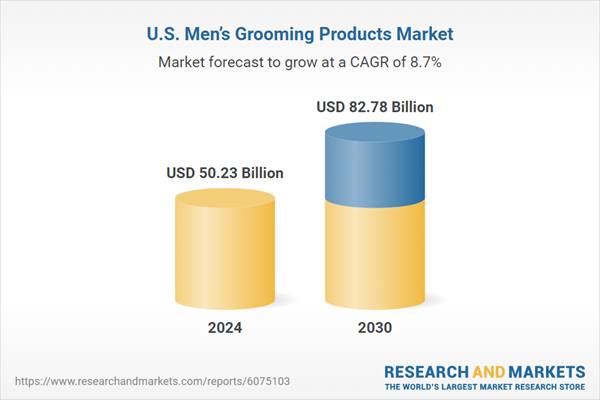Speak directly to the analyst to clarify any post sales queries you may have.
10% Free customizationThis report comes with 10% free customization, enabling you to add data that meets your specific business needs.
Younger demographics, particularly millennials and Gen Z, are fueling demand for premium, sustainable, and personalized grooming products. The increasing appeal of organic and natural formulations has further shifted consumer preferences. Additionally, the expansion of e-commerce, direct-to-consumer models, and subscription-based services has made grooming products more accessible, while enhancing brand engagement. Market dynamics are shaped by the presence of dominant global players alongside agile niche brands catering to specialized grooming needs, fostering a highly competitive and fast-evolving landscape.
Key Market Drivers
Growing Consumer Awareness and Changing Grooming Trends
Shifting societal perceptions and the growing influence of digital culture have made men’s grooming an essential part of personal care routines in the United States. Consumers are moving beyond basic hygiene products and adopting skincare, hairstyling, and beard grooming regimens. The rise of social media influencers and endorsements from public figures has boosted the visibility of grooming practices and inspired men to invest in their appearance. This behavioral shift is especially pronounced among millennials and Gen Z, who favor quality-driven, specialized products tailored to their skin and hair needs. In response, brands are diversifying their offerings and focusing on innovation, leading to the development of unique, high-performance formulations. The increasing focus on self-care and appearance enhancement continues to drive steady demand across the men’s grooming product spectrum.Key Market Challenges
High Market Competition and Brand Saturation
The U.S. men’s grooming products market is marked by intense competition and market saturation. Established multinational corporations such as Procter & Gamble, Unilever, and L’Oréal command significant market share with widespread distribution and brand recognition. At the same time, a growing number of independent and niche brands are entering the market with differentiated offerings, including organic, vegan, and performance-based solutions. This influx of competitors has led to increased pricing pressures and frequent discounting, making it difficult for new entrants to establish a strong foothold. Moreover, the crowded marketplace presents challenges in gaining visibility both in retail channels and online platforms. To succeed, companies must continuously invest in innovation, marketing, and product differentiation while maintaining competitive pricing and quality standards.Key Market Trends
Rise of Hybrid and Multi-Functional Grooming Products
The emergence of hybrid and multi-functional grooming solutions is a prominent trend in the U.S. men’s grooming market. Time-conscious consumers are increasingly opting for all-in-one products that combine the benefits of multiple grooming steps into a single formula. Popular examples include 3-in-1 shampoo, conditioner, and body washes; moisturizers with built-in SPF protection; and beard oils that double as facial moisturizers. These versatile products align with the growing preference for streamlined routines and minimalist grooming practices. They also appeal to frequent travelers and younger consumers seeking convenient yet effective personal care options. In response, brands are investing in advanced formulations and functional innovation to develop products that offer efficiency without compromising quality, driving growth in this expanding segment.Key Market Players
- The Procter & Gamble Company
- Colgate-Palmolive Company
- Unilever PLC
- Estee Lauder Companies, Inc.
- Coty Inc.
- Baxter of California
- Shiseido Co., Ltd.
- Beiersdorf AG
- L'Oréal Groupe
- Reckitt Benckiser Group plc
Report Scope:
In this report, the United States Men’s Grooming Products Market has been segmented into the following categories, in addition to the industry trends which have also been detailed below.United States Men’s Grooming Products Market, By Product:
- Skin Care
- Hair Styling
- Shave/Beard Care
United States Men’s Grooming Products Market, By Distribution Channel:
- Online
- Offline
United States Men’s Grooming Products Market, By Region:
- South
- West
- Midwest
- Northeast
Competitive Landscape
Company Profiles: Detailed analysis of the major companies present in the United States Men’s Grooming Products Market.Available Customizations:
With the given market data, the publisher offers customizations according to a company's specific needs. The following customization options are available for the report.Company Information
- Detailed analysis and profiling of additional market players (up to five).
This product will be delivered within 1-3 business days.
Table of Contents
Companies Mentioned
- The Procter & Gamble Company
- Colgate-Palmolive Company
- Unilever PLC
- Estee Lauder Companies, Inc.
- Coty Inc.
- Baxter of California
- Shiseido Co., Ltd.
- Beiersdorf AG.
- L'Oréal Groupe
- Reckitt Benckiser Group plc
Table Information
| Report Attribute | Details |
|---|---|
| No. of Pages | 84 |
| Published | April 2025 |
| Forecast Period | 2024 - 2030 |
| Estimated Market Value ( USD | $ 50.23 Billion |
| Forecasted Market Value ( USD | $ 82.78 Billion |
| Compound Annual Growth Rate | 8.6% |
| Regions Covered | United States |
| No. of Companies Mentioned | 10 |









